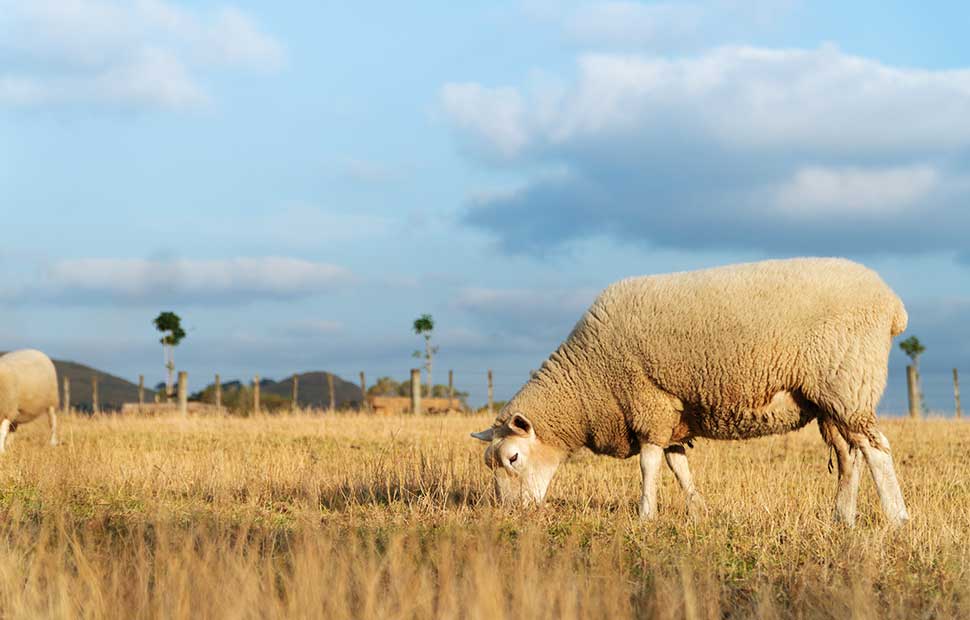Getting your animals through an El Niño summer SPONSORED

Have you put things in place on your block to help your animals get through this period?
Words: Adele Ashton, Ministry for Primary Industries
You may have heard about or are starting to experience El Niño summer conditions. This includes strong, frequent westerly winds, particularly in eastern areas and limited rainfall. We may be seeing a drier than usual summer as a result. Have you put things in place on your block to help your animals get through this period?
FEED
Making sure you have enough supplementary feed on hand is key during dry weather. Animals’ nutritional needs will change depending on growth, pregnancy, lactation, and weather conditions. Try to actively monitor your animals’ body condition to ensure your feed budget takes these different factors into account. Your veterinarian can help develop a feed plan, provide nutritional advice, undertake pregnancy testing and body condition scoring.
Any supplementary feed should be gradually introduced to an animal’s diet to allow them to adapt to it and help prevent digestive problems such as lactic acidosis or grain overload. Talk to your veterinarian or feed supplier about what the best feed for your animals and situation is.
Tip: Remember to place an order with your local feed supplier as soon as possible, as it may take a while to arrive.
WATER
Animals can drink up to three times their regular water intake on hot days. Monitor your property’s water levels, check for water leaks, and ensure you have enough supply to get through an extended dry period.
KEEPING COOL
It’s important that your sheep are shorn and plenty of shelter is available to your animals. Keeping them cool will not only help them be more comfortable but also help with reducing their water intake. Try not to keep animals in confined spaces like sheds or yards, particularly at high densities, as this can reduce airflow and cause heat-related issues.
Watch out for signs of heat stress in your livestock including:
• Hyperventilation
• Panting and open mouth breathing
• Excessive drooling
• Seeking shade
• Decreased appetite
• Increased water consumption
OVERSTOCKED?
Your stocking rate needs to be low enough that there is enough pasture to feed the number of animals on it. Consult a rural professional or your veterinarian to determine your ideal stocking rate. Overstocking means animals don’t get the nutrition they need, which can cause animal welfare problems. If you need to reduce your stocking rate, it’s important to make these decisions early — before the welfare of your animals is compromised.
It’s usually more cost-effective to sell animals than to buy feed in. You could try selling through a stock agent, farmer, or online sites. If you want to go through a meat processor, contact your local plant or agent as early as possible to check their protocols and current wait times. Registered homekill butchers or petfood operators are also an option.
COMMUNICATE
Talk to your neighbours, farmers, other lifestyle block owners, and your veterinarian. Planning ahead and building your support network can help alleviate pressures.
These organisations have people who understand the challenges and can
provide advice:
• Federated Farmers: 0800 327 646
• Need to talk? Call or text 1737 or visit: www.allright.org.nz/campaigns/getting-through-together
• MPI
Don’t forget that your animals are your responsibility and you need to plan for them accordingly.
Under the Animal Welfare Act 1999, you must provide your animals with:
• Proper and sufficient food and water;
• Adequate shelter;
• The opportunity to display normal patterns of behaviour;
• Appropriate physical handling;
• Protection from and rapid diagnosis of injury and disease.
Need more info on animal welfare? Scan the QR code, or email animalwelfare@mpi.govt.nz

Love this story? Subscribe now!
 This article first appeared in NZ Lifestyle Block Magazine.
This article first appeared in NZ Lifestyle Block Magazine.
